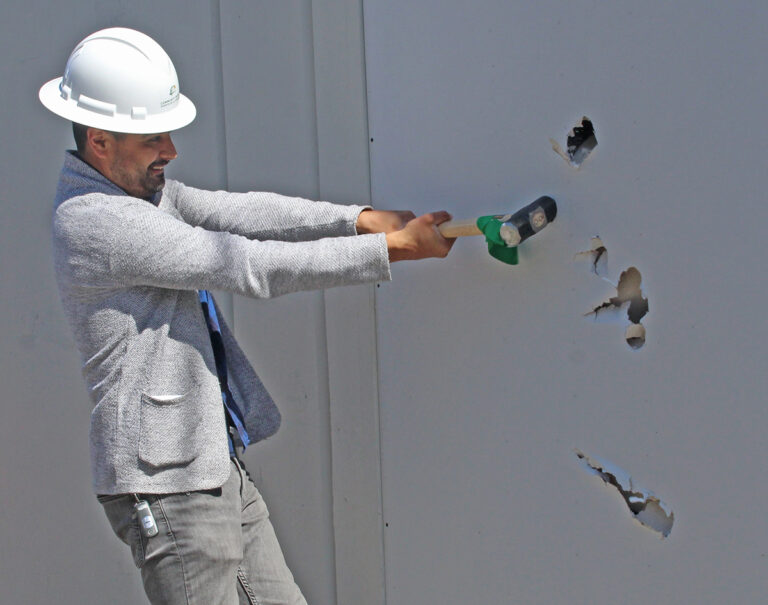Living in a tight-knit community like the San Lorenzo Valley has its advantages. When a neighbor needs assistance or a business is in trouble, locals rally to help. And when hundreds of residents lose their homes in a devastating wildfire and are in desperate need of resources, local agencies combine forces to provide support.
Hallie Greene, district manager of the Boulder Creek Recreation and Park District, understands the issue from both sides. Greene, who lost her Boulder Creek home to the CZU Lightning Complex in 2020, has found herself operating as the nexus between residents who need help, and those organizations that are willing to provide it: enter the Santa Cruz Long Term Recovery Group (SCLTRG), which has provided support for CZU survivors since its inception in 2021.
“About a month or so after the fire, I started to collaborate with nonprofits; United Policy Holder took on the role of helping with the recovery process, and we brought connected county and national assistance groups into the fold,” Greene said. “Ultimately, we formed a long-term recovery group; we’re not so much an entity as [much] a consortium of nonprofits and county organizations.”
This weekend, the group is hosting community meetings for residents who need assistance weaving their way through the rebuilding process. The first meeting is set for March 26 at noon at the Boulder Creek Recreation and Park office (13333 Middleton Ave.) behind the Boulder Creek Volunteer Fire Department Station 1. The second is slated for March 27 at 1pm at Bonny Doon Elementary School (1492 Pine Flat Road).
Residents from either area are welcome to attend any of the meetings. In addition, the Boulder Creek Fire Protection District will participate in the question and answer periods to answer post-CZU rebuild questions.
Both meetings will be live-streamed on Facebook: facebook.com/SCLTRG.
As the only fire survivor on the committee, Greene liaises between agencies with the personal insight that comes from the daunting experience of losing everything in a catastrophe.
The intent of the group was to vet out projects, grant funds and look for solutions when issues arose in the process of planning a rebuild. The group, which has been meeting monthly since the fire swept through the area, took on a major role in last year’s recovery projects at the Bear Creek Community Center. Greene says the county has supplied a grant to help maintain outreach and training for case managers to help survivors.
“Case management is picking up more and more, now that people are in the phase of recognizing their needs to move forward,” she said.
Greene said there are three primary agencies that are taking the lead on providing that assistance. Catholic Charities got the state grant to run case management, Community Bridges obtained separate grants to directly help fire victims and the Davenport Resource Center, which is run by the Community Action Board of Santa Cruz County, is available to help those in the Bonny Doon area.
She points out that the case managers at Catholic Charities have taken the lead in providing monetary assistance.
“They’ve been working throughout this last year to help people with specific needs to get pre-clearance payments done, or other specifics regarding rebuilding. In addition to helping homeowners, they’ve provided assistance to renters too, or people who lost a vehicle or place to live,” Greene said.
Greene explained that she has recently been working in more detail on bulk purchasing—the more people that reach out and identify their needs, the better able the group is to provide those items. Greene notes that the Community Foundation is holding fire funds, and planning to provide assistance for upcoming projects. Case managers are so important in this venue, says Greene.
“So many fire victims thought that the case managers were only available for people who lost everything, or for those who were low income or had no insurance. In reality, there’s help for everyone, and there might be resources, however small, that are available to those in need,” Greene said.
One of those entities providing resources and support is Mountain Community Resources in Felton, which is operated under the Community Bridges umbrella. Jayme Ackemann, a spokesperson for Community Bridges, said the satellite location in the Santa Cruz Mountains helped organize evacuations, shelter and personal necessities for families during the fire.
“We worked closely with more than 125 fire families in the years since to coordinate additional support including relocation funding, identifying permanent housing if needed and providing grants to cover unexpected costs like first and last month’s rent and security deposits where needed,” Ackemann said. “We’ve also worked to help navigate the unique challenges that are keeping fire families from being able to return to their properties, including identifying grant funding for unique needs like new wells, fire hydrants, septic systems and other services needed to allow someone to safely live on their property.”
Ackemann says the nonprofit’s current efforts are focused on helping identify eligible candidates for the Mennonite home rebuilding program.
“Through this event, we plan to collect information from participants to determine if others may be eligible to apply for assistance with the cost of rebuilding their home,” Ackemann said. “Mountain Community Resources is serving as the local liaison to help connect eligible community members with this assistance.”
Boulder Creek Fire Protection District Chief Mark Bingham said he joined the recovery group to “try something new and see if attending the community rebuild meetings would help CZU survivors.”
“The thing is at the end of the day, people still don’t have the right information a lot of the time and, more importantly, they don’t have their homes rebuilt yet,” he said. “It weighs on me.”
Bingham said Boulder Creek Fire is working with the 4leaf, the Pleasanton-based consulting company the county brought in to set up and manage a Recovery Permit Center under its watch in hopes of streamlining the permitting process.
“The offer for 4leaf to assist the Fire District was extended and we jumped on it,” Bingham said. “Frankly, we just don’t have the manpower to quickly and efficiently review and process the estimated volume of permits that could come our way from CZU survivors. I am pleased with how our relationship is working with 4leaf and am thankful to the county for making the connection. People need to know we are here for them, we are in this together. The Fire District’s No. 1 priority is the safety of our public and we take great pride in providing that service.”
Santa Cruz County 5th District Supervisor Bruce McPherson said the SCLTRG “has played an instrumental role in helping our community recover from the CZU Fire.”
“I have been impressed by the outreach the team has made to survivors and the cooperative role they have played in partnership with the County to address people’s needs,” he said.
For information about the meetings, visit facebook.com/SCLTRG.























